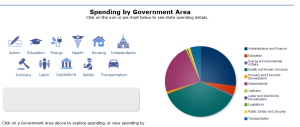Our Transparency Resolutions for 2015
 A new year lies ahead, and with it comes new opportunities to right past wrongs. For transparency advocates in Massachusetts, those opportunities couldn’t come soon enough. After years of truly abysmal public records policy, 2015 is shaping up to be a valuable opportunity to not only get Massachusetts up to the national standard, but to set an example in open government that other states will follow.
A new year lies ahead, and with it comes new opportunities to right past wrongs. For transparency advocates in Massachusetts, those opportunities couldn’t come soon enough. After years of truly abysmal public records policy, 2015 is shaping up to be a valuable opportunity to not only get Massachusetts up to the national standard, but to set an example in open government that other states will follow.
Here’s what we’re hoping to see in 2015:
Create a State CBO
We want to reaffirm our proposal to advance true legislative transparency through the statutory creation of a State Congressional Budget Office. The Commonwealth should establish an independent office to conduct a cost-benefit analysis for bills that would either raise revenue or involve the eventual spending of money. Bills with an estimated financial impact of more than $1M would be subject to the analysis.
Establishing an office in Massachusetts run by the Inspector General to independently assess the cost/revenue of bills with an expected budgetary impact in excess of $1M would improve decision-making and accountability and promote both efficiency and public trust. This office would be required to publish each analysis, including assumptions, on its website in a timely basis. As part of the proposal, the Inspector General should be limited to a single six-year term without the possibility of reappointment.
Open Meeting and Public Records Laws Applied to State Legislature
Under Massachusetts law, the state Legislature is not considered a “public body” in a traditional sense, and therefore enjoys bizarre exemptions from open meeting and public records laws – such as the right to close a meeting to the public via majority vote or claim any discussion of policy as private “so long as no final agreement is reached.” Through these special exemptions and the lack of any real oversight beyond a toothless Ethics Committee, the Legislature controls even what questions we’re allowed to ask about what they do. While voting is public, the process that led to that vote is only as public as the Legislature wants it to be, creating the only thing worse than flagrant disregard for transparency – the illusion of transparency. We need to demand real openness in state government, and there’s no better place to start than here.
Public Money Means Public Records
Massachusetts has several “quasi-public” entities — MassDevelopment, Convention Center Authority, and Regional Transit Authorities, to name a few — that receive public funding but claim to be exempt from public laws on the grounds that they’re private institutions and don’t want to risk losing their “competitive edge” by releasing valuable proprietary information. If an entity is taxpayer-funded, taxpayers have a right now know what it’s doing with their money. Simple as that.
Invoices and Contracts for Every Vendor on OpenCheckbook
When Massachusetts Open Checkbook launched three years ago, it was fantastic step forward in how the state handled open records, providing comprehensive details about the budget to anyone with an internet connection. But comprehensive does not mean complete, and there are some critical omissions to what’s made available. Rather than just dollar amounts, we should have access to what vendors are charging us and exactly what we’re being charged for. Corruption thrives on ambiguity, and it’s not enough to simply tell us how much of our money is being spent. And while we’re at it, have Open Checkbook cover every municipality – transparency isn’t just a state issue.
Public Records officers for Every Agency
In the absence of a public records officer, a request is an unwanted burden, “yet another thing” an agency has to deal with. This translates into a glacial fulfillment rate, ignorant or overzealous redactions, and the imposition of ludicrous fees. Agencies need to understand that transparency isn’t a fad; people are not going to stop wanting to know what their government is doing and how their tax dollars are being spent. Assigning competent, passionate public records professionals makes everyone’s lives easier, and shows a commitment to transparency that goes beyond lip service.
Cap on Cost for Public Records that are Stored Electronically
Several agencies, most notoriously the Boston Police Department, refuse to release digital records on the grounds that such records could be altered. As a result, records such as emails, which can easily exported as .pdfs and burned to a CD, are printed out and hand-redacted, leading to prohibitive labor costs, ending requests before they’ve even begun. As a nationwide leader in technology – it is the Massachusetts Institute of Technology, after all – this is ridiculous. To its credit, the City of Cambridge recognized this discrepancy, and is working with MuckRock on an effective digital solution that we’re hoping to expand to the rest of the state.
Stronger Penalties for Delinquent Agencies, and an Effective Appeal System that Actually Serves the Public’s Interest
I’ve said this before, so I’ll be brief. The Massachusetts Supervisor of Public Records, the state’s ostensibly independent transparency watchdog, is at best a nonentity, and at worst an obstacle for a requester to overcome. We need a means of holding agencies responsible. We need an appeal system that offers an alternative to court costs. Secretary of State Galvin has proven to be the wrong person for both.
Eliminate “Executive Order” Privilege from Governor’s Office
Few have likely even heard of Lambert v. Executive Director of the Judicial Nominating Council, but this obscure 1997 Massachusetts Supreme Judicial Court ruling upheld the Governor’s right to not comply with an executive order. As such, all public records requests to the Governor’s office are fulfilled “at the office’s discretion.” This “I don’t have to give you this, but I will do it anyway” attitude transforms public records from a right to the noblesse oblige of elected officials, and there’s no way of knowing how many requests to the Governor’s office weren’t made simply due to the looming threat of blanket denial. Gov. Baker has a valuable opportunity to make it clear that his administration serves the public interest all the time, not simply at its “discretion.”
Reinforce the Idea that the Onus is on the Agency to Explain why Something Shouldn’t be Released, not on the Requester to Explain Why it Should.
This last bit was a key part of the sadly deceased National Freedom of Information Act reform bill that we would love to see applied to Massachusetts. These are our records. This is our government. We call the shots, and public officials need to remember that. It’s not our responsibility to explain why we want to see a more transparent Massachusetts. It’s up to them to explain why they think we shouldn’t. And if they’re unwilling to have the conversation on those terms, they shouldn’t be in government. Let’s make it happen.
J. Patrick Brown is the Editor of Muckrock.com, an organization which facilitates public record requests and serves as an independent news source covering government transparency issues nationwide.
Mary Connaughton is Director of Administration & Finance at Pioneer Institute, where she oversees transparency initiatives.




